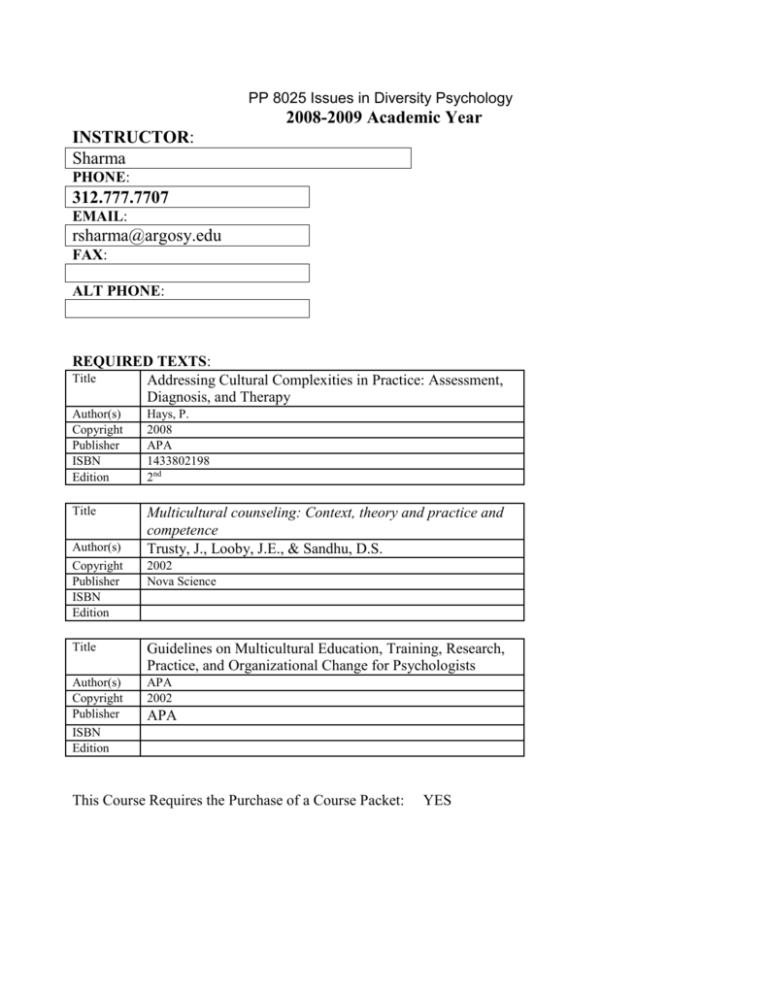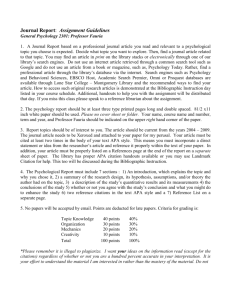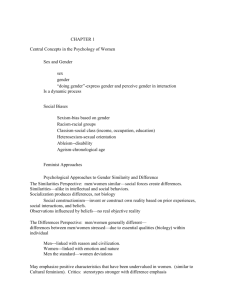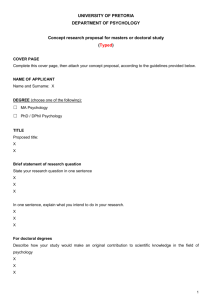Diversity Psychology - Argosy University Dissertation Site
advertisement

PP 8025 Issues in Diversity Psychology 2008-2009 Academic Year INSTRUCTOR: Sharma PHONE: 312.777.7707 EMAIL: rsharma@argosy.edu FAX: ALT PHONE: REQUIRED TEXTS: Title Addressing Cultural Complexities in Practice: Assessment, Diagnosis, and Therapy Author(s) Copyright Publisher ISBN Edition Hays, P. 2008 APA 1433802198 2nd Title Multicultural counseling: Context, theory and practice and competence Trusty, J., Looby, J.E., & Sandhu, D.S. Author(s) Copyright Publisher ISBN Edition 2002 Nova Science Title Guidelines on Multicultural Education, Training, Research, Practice, and Organizational Change for Psychologists Author(s) Copyright Publisher ISBN Edition APA 2002 APA This Course Requires the Purchase of a Course Packet: YES Issues in Diversity Psychology: Past, Present, & Future(PPxxxx) Fall 2008; Wednesdays, 12:30-3:15pm Argosy University, Chicago *Pre-requisite: PP8185 – Social Psychology and Difference COURSE SYLLABUS – Draft August 2008 Rahul Sharma, Psy.D., Instructor Office Hours: Tue, 3:30-5pm; Thurs. 1-3pm; by appt. Teaching Assistant TBA 312.777.7707 rsharma@argosy.edu Course Description: The study of clinical psychology must include an exposure the burgeoning literature on the multifaceted topics that are captured by the umbrella concept of “diversity psychology.” This course will lay out the basic concepts embodied by the much-used terms “diversity” and “multiculturalism” as they relate to the theory and practice of Clinical Psychology. Also, a thorough, working definition of “cultural competence” will be highlighted. The course will begin with a historical perspective on how and when various issues of diversity and multiculturalism were introduced in to the field. Key models will be introduced (e.g., Racial/ethnic identity development; power and privilege; models of acculturation; women’s issues; LGTBQ identity development) with an eye towards current/evolving discourse within the field of diversity psychology. A mid-term exam will be given, covering the readings through mid-term. During the 2nd half of the course, students will undertake an investigative project where they will focus on one aspect of diversity in terms of clinical considerations (e.g., racial/ethnic identity development; LGTBQ issues; women’s issues; poverty issues ; disability issues; etc.). Students will present, summarize, and critique current literature, incorporating concepts covered in the syllabus as well as more in-depth literature on the particular subject they are investigating. This investigation involves two parts: 1) a structured presentation to the rest of the class; and 2) a final 12-17 page paper that will synthesize syllabus and project readings relevant to this topic, and conclude with proposed areas for further research, clinical training, and clinical work in the field. Course Purpose: Given the current demographics of the United States, issues of diversity must become a part of clinical psychologists’ core competencies. The study of clinical psychology must include an exposure the burgeoning literature on the multifaceted topics that are captured by the umbrella concept of “diversity psychology.” This course is designed to deepen the diversity concepts introduced through Social Psychology and Difference, and allow students to engage in a critical review of current literature on a select number of subtopics within diversity psychology. This course is the first of two core Diversity Concentration courses. Objectives: 1) Continue awareness of group identities in terms of ability status, race, ethnicity, gender, sexual orientation, country of origin, religion, and age. (Core Competency: Diversity) Assessment: This objective will be assessed in the quality of your class presentation, your subsequent investigative paper, and your participation in class discussion and experiential exercises. 2) Enhance intellectual independence and critical thinking. (Core Competency: Critical Thinking) It is important for students to form and articulate a point of view about literature on culture, social context, and clinical implications, since you will be practicing your profession within the wider context of society with clients with diverse contexts. The class is a venue in which you may learn about existing ideas and supplement them with your ideas and views within a mutually supportive and respectful environment. In addition, you will learn to express dissenting views, critique the views of others, and learn from your peers’ perspectives on these complex issues. Assessment: This objective will be assessed by your participation in discussions within the class, mid-term examination, and final paper. Mission Statement: Program Outcomes: The Doctoral program in Clinical Psychology at Argosy University Chicago Campus is an APA accredited program (APA, 750 First St. NE, Washington, DC 20002, 202-3365500). This program is designed to educate and train students so that they may eventually be able to function effectively as clinical psychologists. To ensure that students are prepared adequately, the curriculum provides for the meaningful integration of theory, training and practice. The Clinical Psychology program at Argosy University Chicago Campus emphasizes the development of attitudes, knowledge, and skills essential in the formation of professional psychologists who are committed to the ethical provision of quality services. Specific objectives of the program include the following: Goal 1: Prepare professional psychologists to accurately, effectively, and ethically select, administer, score, interpret, and communicate findings of appropriate assessment methods informed by accepted psychometric standards and sensitive to the diverse characteristics and needs of clients. o Objective 1a: Accurately and ethically administer and score various psychodiagnostic instruments. o Objective 1b: Accurately interpret and synthesize assessment data in the context of diversity factors, referral questions, and specific objectives of the assessment, and organize and communicate results in writing and orally. o Objective 1c: Examine psychometric properties of psychological assessment instruments, and use that knowledge to evaluate, select, administer, and interpret psychological tests and measures appropriate for the client, the referral question, and the objectives of the assessment. Goal 2: Prepare professional psychologists to select, implement, and evaluate psychological interventions consistent with current ethical, evidence-based, and professional standards, within a theoretical framework, and with sensitivity to the interpersonal processes of the therapeutic relationship and the diverse characteristics and needs of clients. o Objective 2a: Synthesize the foundations of clinical psychology, including psychopathology, human development, diagnosis, diversity, ethics, and various therapeutic models in clinical applications. o Objective 2b: Select, plan, and implement ethical and evidence-based interventions with sensitivity to the diverse characteristics and needs of clients. o Objective 2c: Demonstrate knowledge, skills, and attitudes to effectively implement and participate in psychological consultation and supervision. Objective 2d: Demonstrate personal development and self-reflective capacity, including growth of interpersonal skills, and therapeutic relationships. Goal 3: Prepare professional psychologists to analyze the complexity and multidimensionality of human diversity, and demonstrate the knowledge, skills, and attitudes necessary to understand diverse worldviews and the potential meaning of social, cultural, and individual differences for professional psychological services. Goal 4: Prepare professional psychologists to examine the historical context and the current body of knowledge of biological, cognitive, affective, developmental, and social bases of human functioning. Goal 5: Prepare professional psychologists to critically evaluate the current and evolving body of scholarly literature in psychology to inform professional practice. Mid-Term Exam This mid-term exam, comprised of multiple choice, short-answer, and essay items, will be administered on the 7th week of the course. Structured Presentations Students must pick topics (and email the professor for approval) by the 8th week of the course. Examples of appropriate topics include: Current Identity Development Theories on Multi-Racial Individuals; Issues in Acculturation Measures; Clinical Issues for Gay Men of Color; The Clinical Relevance of ‘Microinsults.’ Presentations will be held Weeks 10-12. Presentations are to be 30 minutes, and must include: 1. A didactic presentation (preferably on Power Point) on the chosen topic, including: -a summarized overview of current discourse on the topic (10 minutes) -YOUR assessment of current/evolving discourse on aspects of the topic that either have yet to be explored, or are in need of greater clarity or attention (10 minutes) 2. A discussion and Q & A, moderated by the instructor (10 minutes) The purpose of this assignment is to begin to evaluate each student’s conceptual and critical thinking abilities on areas of diversity. Final Paper This paper, 13-17 pages in length, must incorporate both course readings as well as outside readings on the sub-topic chosen for class presentations. [NOTE: at least 5 of your citations must include research from the last 5 years.] The paper must provide a thorough review of the literature (8 to 10 pages), as well as a critical analysis of findings and suggested “next steps” in the area (5 to 7 pages). In addition, the paper should incorporate feedback/ideas generated by the instructor and peers during each student’s presentation. This assignment is due on the last week of the course. Required Texts: (The following publications are required. In addition, a course packet will be provided containing many of the supplemental assigned readings.) Guidelines on Multicultural Education, Training, Research, Practice, and Organizational Change for Psychologists. American Psychological Association. Approved as APA Policy by the APA Council of Representatives, 2002. Hays, P. (2008). Addressing Cultural Complexities in Practice: Assessment, Diagnosis, and Therapy. 2nd Ed. American Psychological Association: Washington D.C. Trusty, J., Looby, J.E., & Sandhu, D.S. (2002). Multicultural counseling: Context, theory and practice and competence. Huntington, NY: Nova Science. COURSE OUTLINE Week I: The What, Why, and How of Cultural Competence -Backdrop: why is cultural competence needed -Definitions: Multiculturalism, Diversity, & Cultural Competence Readings: APA Guidelines pages 1-30; 43-49 (Intro; guidelines 1, 2, and 5) Trusty et al., Chapter 2 Tyson, S. Y. (2007). Can Cultural Competence Be Achieved Without Attending To Racism? Issues in Mental Health Nursing, Dec2007, Vol. 28 Issue 12, p1341-1344, Iglehart, A.P. and Becerra, R. M. (2007). Ethnic-Sensitive Practice: Contradictions and Recommendations. Journal of Ethnic & Cultural Diversity in Social Work, 2007, Vol. 16 Issue 3/4, p43-63 Allen-Meares, P. (2007). Cultural Competence: An Ethical Requirement. Journal of Ethnic & Cultural Diversity in Social Work, 2007, Vol. 16 Issue 3/4, p83-92. Bernard, W.T. and Morian, J. Cultural Competency: An Individual or Institutional Responsibility? Canadian Social Work Review, 2007, Vol. 24 Issue 1, p81-92, Pope-Davis, D. B. (2001) What's Missing From Multicultural Competency Research: Review, Introspection, and Recommendations. Cultural Diversity & Ethnic Minority Psychology, May 2001, Vol. 7 Issue 2, p121-138. Week II: Overview of “Worldview;” a historical look at how psychology began addressing diversity -In class video: APA video on the pioneers of diversity psychology [*still searching for title – I saw it at the 2007 MC Summit, and I believe it is yet to be published]] Readings: Markus, H. R., & Kitayama, S. (2001). The cultural construction of self and emotion: Implications for social behavior. In W. G. Perrod (Ed.), Emotions in social psychology: Essential reading (pp 119–137). Philadelphia: Brunner-Routledge. Trusty et al., Chapter 1 Week III: Why focus on certain groups – examining oppression and implications for psychology -Overview of oppression -Commonalities/distinctions between various forms of oppression -Clinical implications Readings: Abreu, J. M. (2001). Theory and research on stereotypes and perceptual bias: A resource guide for multicultural counseling trainers. The Counseling Psychologist, 29, 487– 512. Liu, W.M. and Pope-Davis, D.B. (2006). Moving from Diversity to Multiculturalism: Exploring Power and Its Implications for Multicultural Competence. In Handbook of Multicultural Competencies in Counseling and Psychology, Pope-Davis, D.B. et al. (eds.), Sage Publications. Jones, J. (2003). Constructing Race and Deconstructing Racism: A Cultural Psychology Approach. In Handbook of Racial & Ethnic Minority Psychology Bernal, G. et al. (eds.), pp. 276290. Sage Publications. Plous, S. (2002) The Psychology of Prejudice, Stereotyping, and Discrimination: An Overview. In Plous, S. (ed) Prejudice and Discrimination: The Cycle of Socialization. McGrawHill. Week IV: The impact of acculturation -historical models on acculturation -acculturation measures -debates on acculturation Readings: Marin, G., et al. (2003) Acculturation Research: Current Issues and Findings. In Handbook of Racial & Ethnic Minority Psychology. Bernal, G. et al. (eds.), pp. 208-219. Sage Publications. Hawley, S. R. (2007). Developing a bicultural model for academic achievement: A look at acculturative stress, coping, and self-perception. Hispanic Journal of Behavioral Sciences, Vol 29(3), Aug 2007. pp. 283-299. Walker, R.L. (2007). Acculturation and acculturative stress as indictors for suicide risk among African Americans. Walker, Rheeda L.; American Journal of Orthopsychiatry, Vol 77(3), Jul 2007. pp. 386-391. Week V: Racial/Ethnic Identity development (ID) models -Minority Development models -White ID Models Readings: Trusty et al., Chapter 3 (Racial, Ethnic, and Cultural Identity Development Models) Rockquemore, J. and Brunsma, D.L. (2007). Biracial Identity Research: Past and Present (chapter). In Beyond Black: Biracial Identity in America. Rowman & Littlefield. Ponterotto, J.G., et al. (2006). [portions of Chapter 4: Person of Color (Minority) Identity Development, Mental Health, and Prejudice; Chapter 5: European American (White) Racial Identity Development, Mental Health, and Prejudice]. In Preventing Prejudice: A Guide for Counselors, Educators, and Parents. 2006. Sage Publications, pp. 62-108 [ALTERNATE/ADDITION: Sue & Sue's Counseling with Diverse Populations: Theory and Practice (4th ed.) Racial/Cultural Minority Identity Development: Therapeutic Implications, as well as White Racial Identity Development (chapters)] Week VI: Cultural Competence with LGBTQ and Gender -LGBTQ identity clinical considerations -current discourse on gender and sexuality Readings: Ponterotto, J.G., et al. (2006) Chapter 6: Biracial, Multiracial, and Gay or Lesbian Identity Development. In Preventing Prejudice: A Guide for Counselors, Educators, and Parents. Sage Publications, pp. 109-127 APA's Handbook on psychotherapy with GBLT clients Goldfried, M.R. (2001). Integrating Gay, Lesbian, and Bisexual Issues into Mainstream Psychology. America Psychologist (2001) 56 (11), pp. 975-988. Week VII: Newer challenges in Diversity Psychology – multiple identities Readings: Fong, R. (2007). Diversity in Diversity: Changing the Paradigm. Journal of Ethnic & Cultural Diversity in Social Work, 2007, Vol. 16 Issue 3/4, p113-121 Identity and Social Support for Lesbian and Gay Ethnic Minorities. Gallor, Susanna M.; Fassinger, Ruth E.; Washington, District of Columbia, US: American Psychological Association, 2004. n pp. [Conference Abstract] Week VIII: NJewer challenges in Diversity Psychology – microagressions *Students pick investigative topic Readings: Sue, D.W., et al. (2007). Racial Microaggressions in Everyday Life: Implications for Clinical Practice American Psychologist, Vol. 62, No. 4, pp. 271–286 Week IX: Teaching/training of psychology -towards infusion or “inclusive” psychology -assets and constraints of the field Readings: APA Guidelines pages 30-36 (guideline 3) Mio, J.S. (2003) On Teaching Multiculturalism: History, Models, and Content (chapter). In Handbook of Racial & Ethnic Minority Psychology. Bernal, G. et al. (eds.), pp. 119-146. Sage Publications. Goldstein, S. B. (2005). Cross-cultural perspectives in the psychology curriculum: Moving beyond "add culture and stir" In B. Perlman, L. I. McCann, & W. Buskist, (Eds); Voices of experience: Memorable talks from the National Institute on the Teaching of Psychology, Vol. 1, (pp. 45-57), Washington, DC: APA. Weeks X-XII: STUDENT PRESENTATIONS (4 per week) Week XIII: Exploring the Cutting Edge of Diversity Psychology: Crucial ‘Next Steps’ -having an impact on the field of psychology as a whole -continuing cultural competence development -identifying and addressing ongoing challenges Readings: APA Guidelines pages 50-62 (guideline 6 & conclusion) Week XIV: FINAL PAPER DUE (no class)






